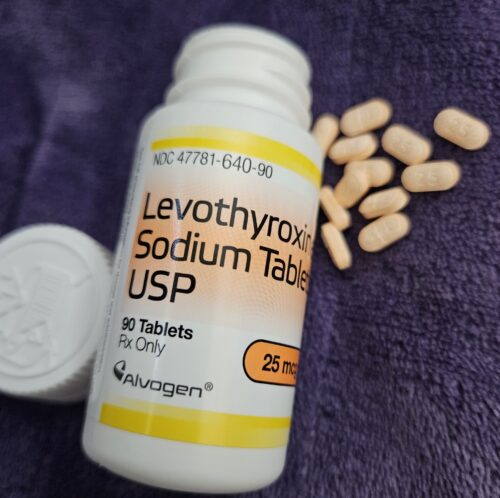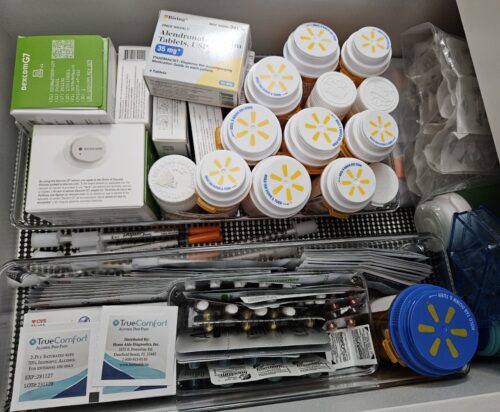I recently wrote about my own experience with GLP-1s and losing a lot of weight on Vitamin D. I was on Trulicity for a year and now on Mounjaro. As I got lower and lower in weight, my doctor lowered my Vitamin D supplement. Even though I have been off the D for three+ months now, my Vitamin D labs are still in the toxic range.

What Happens to Our Medications When We Lose Weight?
If you have obesity and even overweight, you might be on high blood pressure meds, cholesterol and triglyceride medications. If you are diabetic like me, you might also be on insulin as I was for over ten years.
What doctors might be forgetting is to change our dosages of medications as we are losing weight.
In one of the click-bait-ish headlines ever, A Man’s Rapid Weight Loss From Obesity Drug Led to Heart Problems, says:
A 62-year-old man ended up in the emergency room with hand tremors and heart palpitations six months after he began taking the weight-loss drug tirzepatide, also known as Zepbound. According to his doctors, the man’s heart predicament was likely caused by an overdose of his thyroid medication that wasn’t adjusted properly following his rapid weight loss from tirzepatide.
A less Click-Batey article Monitor Antiobesity Drug Dosing After Rapid Weight Loss talks about the same case from a medical perspective including from endocrine and cardiac physicians.

The heart problems were not from the Zepbound at all, but his weight loss affecting his thyroid medication. An added issue was the gentleman also has Type 1 Diabetes and GLP-1s are not yet approved for Type 1 diabetics, although there are a significant amount of Type-1 folks using them.
The last thing I learned about this patient in the second article is he was quite aware of his need to change his insulin dosages. As he lost weight, his insulin needs also lowered.

Although patients can change their insulin doses, they cannot change the levothyroxine doses since it requires a blood test [thyroid-stimulating hormone; TSH] and a new prescription of the new dose.
We who are on thyroid meds cannot self-adjust like we can with insulin. Not knowing the side effects of the over-medicated thyroid medication is what led the patient with heart palpitations to the ER.
The case involved a 62-year-old man with obesity, hypothyroidism, and type 1 diabetes who presented to the emergency department with palpitations, excessive sweating, confusion, fever, and hand tremors. Upon being diagnosed with atrial fibrillation, the patient was immediately treated.
I have been on thyroid medication for 15 years and never have I been told what side effects of an over-medication of it would look like. I didn’t even know there were side effects! But I also have my thryroid values checked every three months with all of my Endo labs and they have been fine, so no needing to change my “subclinical” (low) dosage.

The first article’s comments declared this was completely the fault of his provider, but it seems no one was at fault.
When he was prescribed tirzepatide, 2.5 mg weekly, for obesity, the patient had been recommended to increase the dose every 4 weeks as tolerated and, importantly, to have a follow-up visit in a month. But because he lived in different states seasonally, the follow-up never occurred.
This was a great teaching moment for those of us on GLP-1s.
What Medications Might Need
Readjusting as We Lose Weight?
Doctors are the ones who take weight into account when prescribing all medications. Fast weight loss does not only happen with GLP-1 medications, but also with weight loss surgeries or severe illnesses. It was unusual for the patient in the above article to not receive follow-up care. I think this is a loud warning for all of us taking any medications, but especially if we are taking more than one medication, a practice called polypharmacy.

Oxford English Dictionary says polypharmacy is:
- the simultaneous use of multiple drugs to treat a single ailment or condition.
- the simultaneous use of multiple drugs by a single patient, for one or more conditions.
Meds particularly vulnerable to our losing a lot of weight, by any method:
…range from anticoagulants, anticonvulsants, and antituberculosis drugs to antibiotics and antifungals, the authors note.
Of note, medications with a narrow therapeutic index include phenytoin, warfarin, lithium carbonate, digoxin theophylline, tacrolimus, valproic acid, carbamazepine, and cyclosporine.
When Starting GLP-1s, Talk to Doctors
I highly suggest you go over your medications carefully when you are prescribed a GIP/GLP-1 (Mounjaro/Zepbound/compounded tirzepatide) or a GLP-1 (Ozempic/Wegovy/compounded semaglutide). Ask if there are any signs you might need to look for as you lose weight. Even if you are getting labs drawn every three months as I am, you might have symptoms before your next appointment that signal a need to shift your medications.
Even though your provider has a list of current medications, they do not always consider the interactions between the two… or more. I have an amazing pharmacist and even he has not mentioned my needing to discuss dosages with my doctors. He has watched me lose every one of my 245 pounds… from 405 lbs. in April 2022 to 160 lbs. today, August 18, 2024.
What that says is you have to take this issue into your own hands. Advocate for yourself so you do not end up in the Emergency Room with an odd kind of overdose… the kind that isn’t purposeful, yet can also ruin your life.
Let me know in the comments if you have had to change medication dosages as you’ve lost weight with GLP-1s, too. I’m curious to know how many of us there are out there.



Not yet but I’ve started to worry about that. I’ve lost 80 lb in a year on Trulicity. My thyroid was checked in August and that medicine didn’t seem to need adjustments. I’m on the alert about other things, however. This is great content, so thankful to have found your blog!
I am on a very low level of levothyroid and it has never needed to be adjusted. My psych meds have never been adjusted either, thank goodness.